
Roundwood Primary School
Lead with Nurture
Get in touch
-
Email Us
-
Gawcott - Church St, Gawcott, Buckingham MK18 4HY Tel: 01280 813066 Tingewick - Main St, Tingewick, Buckingham MK18 4NL Tel: 01280 848306

Roundwood Primary School
Keeping yourself Safe
Keeping Yourself Safe
At our school, we take your child’s safety very seriously, both in school and out in the community. We believe it’s important for children, parents and carers to have access to clear safety guidance that supports children in different situations: at home, online, travelling, playing, and spending time outside. Below you will find key guidance and helpful links for keeping children safe in the home and in the community.
What this guidance covers
-
At home: understanding safety around the house, including general home safety (e.g. fire safety, kitchen safety, being aware of hazards), safe use of technology, and knowing who they can talk to if something worries them.
-
Out and about in the community: being safe when travelling (walking, cycling), understanding road safety rules, being aware of strangers, knowing what to do if they feel unsafe, and learning how to get help.
-
Online and digital safety: understanding how to use the internet, social media, and devices safely; what to do if they come across things that upset or worry them; and how to keep personal information private.
-
Recognising risks and abuse, and where to get help: helping children understand what is not OK, in behaviour, relationships or online interactions and giving them safe, trusted contacts if they ever feel scared, threatened or upset.
Trusted Resources and Organisations
Here are some UK‑wide organisations and resources we recommend for parents, carers and children, including support for children with diverse needs:
-
NSPCC: Provides advice, support and resources to help protect children from abuse and neglect. Their services “Speak out Stay safe” are designed for primary‑aged children (5–11 years) and help them understand their rights and what to do if they feel unsafe. NSPCC Learning+2NSPCC+2
-
Childnet International: Offers age‑appropriate online safety advice, guidance for parents, and educational materials about staying safe on the internet. ChildNet
-
Internet Matters: A resource for parents and carers with practical tips, device‑specific guides and advice on online safety, privacy and digital well‑being. Internetmatters
-
UK Safer Internet Centre: Provides guidance and support for schools, parents and children on safe and responsible internet use. GOV.UK+2esscp.org.uk+2
-
For safety beyond online (home, water, transport, general community): resources such as those compiled by emergency services and organisations through initiatives like StayWise. These offer free materials on road safety, water safety, fire safety and general wellbeing for children and young people. Fire Service
How You Can Use This Guidance
-
Talk with your child: Use the resources to discuss safety topics in simple, age‑appropriate ways. Ask questions: What would you do if …? Who could you talk to if you felt worried?
-
Share with others: Give this page to extended family, caregivers or anyone else supporting your child, so everyone understands the same safety expectations.
-
Use as part of home routines: Keep reminders up at home (on fridge doors, noticeboards) about safety at home, internet use, and what’s okay / not okay.
-
Support children with extra needs: If your child has additional learning needs, these resources can help guide conversations in a supportive, clear way; you could adapt language, use visuals, social stories, or role‑play to make safety ideas easier to understand.
-
Know where to get help: Make sure children know trusted adults (parents, carers, school staff) and national support lines/organisations they can contact if something doesn’t feel right.